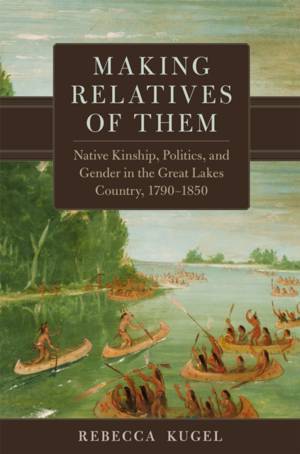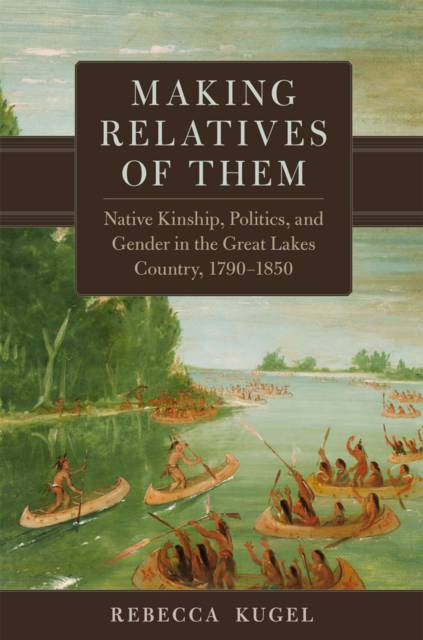
- Afhalen na 1 uur in een winkel met voorraad
- Gratis thuislevering in België vanaf € 30
- Ruim aanbod met 7 miljoen producten
- Afhalen na 1 uur in een winkel met voorraad
- Gratis thuislevering in België vanaf € 30
- Ruim aanbod met 7 miljoen producten
Zoeken
Making Relatives of Them
Native Kinship, Politics, and Gender in the Great Lakes Country, 1790-1850 Volume 21
Rebecca Kugel
€ 62,95
+ 125 punten
Omschrijving
Kinship, as an organizing principle, gives structure to communities and cultures--and it can vary as widely as the social relationships organized in its name. Making Relatives of Them examines kinship among the Great Lakes Native nations in the eventful years of the late eighteenth and early nineteenth century, revealing how these Indigenous peoples' understanding of kinship, in complex relationship with concepts of gender, defined their social, political, and diplomatic interactions with one another and with Europeans and their descendants. For these Native nations--Wyandot, Shawnee, Delaware, Miami, Ojibwe, Odawa, Potawatomi, Dakota, Menomini, and Ho-chunk--the constructs and practices of kinship, gender, and social belonging represented a daily lived reality. They also formed the metaphoric foundation for a regionally shared Native political discourse. In at least one English translation, Rebecca Kugel notes, Indigenous peoples referred to the kin-based language of politics as "the Custom of All the Nations." Clearly defined yet endlessly elastic, the Custom of All the Nations generated a shared vocabulary of kinship that facilitated encounters among the many Indigenous political entities of the Great Lakes country, and framed their interactions with the French, the British, and later, the Americans. Both the European colonizers and Americans recognized the power-encoding symbolism of Native kinship discourse, Kugel tells us, but they completely misunderstood the significance that Native peoples accorded to gender--a misunderstanding that undermined their attempts to co-opt the Indigenous discourse of kinship and bend it to their own political objectives. A deeply researched, finely observed work by a respected historian, Making Relatives of Them offers a nuanced perspective on the social and political worlds of the Great Lakes Native peoples, and a new understanding of those worlds in relation to those of the European colonizers and their descendants.
Specificaties
Betrokkenen
- Auteur(s):
- Uitgeverij:
Inhoud
- Aantal bladzijden:
- 264
- Taal:
- Engels
- Reeks:
- Reeksnummer:
- nr. 21
Eigenschappen
- Productcode (EAN):
- 9780806192826
- Verschijningsdatum:
- 12/09/2023
- Uitvoering:
- Hardcover
- Formaat:
- Genaaid
- Afmetingen:
- 152 mm x 229 mm
- Gewicht:
- 553 g

Alleen bij Standaard Boekhandel
+ 125 punten op je klantenkaart van Standaard Boekhandel
Beoordelingen
We publiceren alleen reviews die voldoen aan de voorwaarden voor reviews. Bekijk onze voorwaarden voor reviews.











